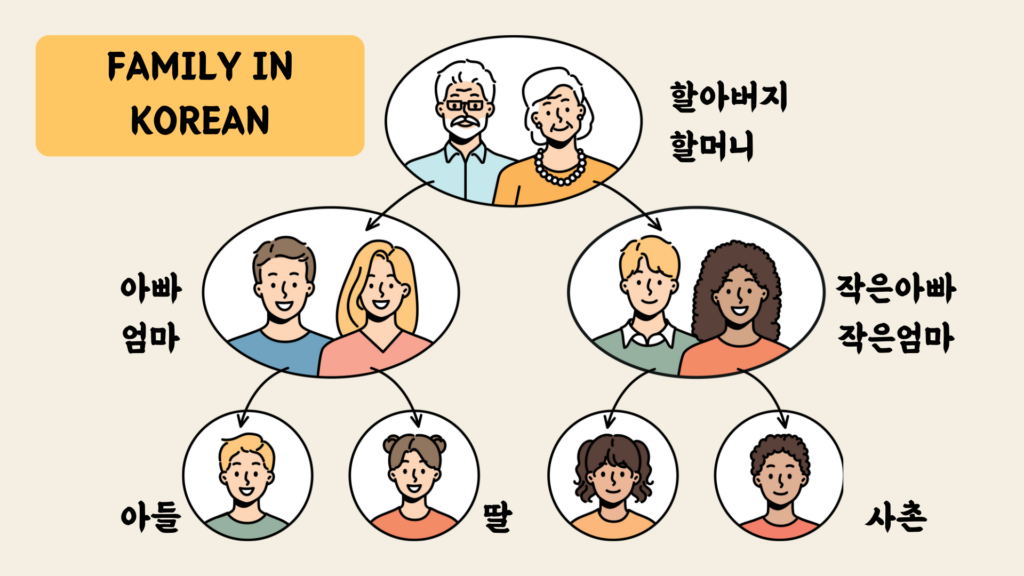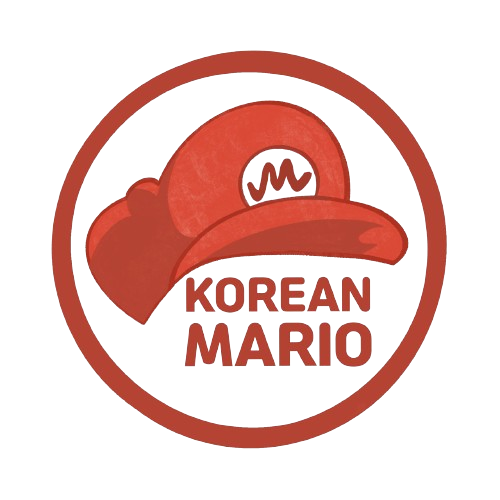
In this tutorial, we’ll explore the vocabulary related to family members in Korean. Whether you’re a beginner or an intermediate learner, this guide aims to provide a comprehensive understanding of how to talk about family in Korean.
Introduction to Family Members Vocabulary
Family is an essential aspect of life, and knowing how to talk about family members in Korean is crucial for effective communication. Let’s begin by learning some common family members:
The word for “family” in Korean is “가족” (pronounced as “gajok“).
Immediate Family Members in Korean

Mother
엄마 (eom ma)
어머니 (eo meo ni)

Son
아들 (a deul)

Daughter
딸 (ddal)

Big brother
형 (hyeong) if you are a boy
오빠 (o bba) if you are a girl

Big sister
누나 (nu na) if you are a boy
언니 (eon ni) if you are a girl

Younger brother
남동생 (nam dong saeng)

Younger sister
여동생 (yeo dong saeng)
Extended Family Members

Cousin
사촌 (sa chon)

Nephew/Niece
조카 (jo ka)
Korean Terms For The Father’s Side of The Family
The next sections might be tougher to learn because there are lots of new words to remember. But some of them could actually be pretty useful. Here, we’ll cover terms that you’d use specifically when talking about your dad’s side of the family.

Father’s side of the family
친가 (chinga)

Father’s older brother
큰아빠 (keun a bba)

Father’s older brother’s wife
큰엄마 (keun eom ma)

Father’s younger brother
작은아빠 (ja geun a bba)

Father’s younger brother’s wife
작은엄마 (ja geun eom ma)

Father’s sister
고모 (go mo)

Father’s sister’s husband
고모부 (go mo bu)
Korean Terms For The Mother’s Side of The Family
Similar to the terms mentioned earlier for your dad’s family, these words are only used when referring to your mom’s side. You might not discuss your parents’ families every day, but knowing these words can be really helpful.

Mother’s side of the family
외가 (wae ga)

Maternal grandfather
외할아버지 (wae ha ra beo ji)

Maternal grandmother
외할머니 (wae hal meo ni)

Mother’s brother
외삼촌 (wae sam chon)

Mother’s brother’s wife
외숙모 (wae sung mo)

Mother’s sister
이모 (i mo)

Mother’s sister’s husband
이모부 (i mo bu)
Korean Terms for Married Couples To Use With Each Other
Unless you’re marrying a Korean or chatting often with someone married to a Korean, this section might not be super useful. But if you plan to marry a Korean or have a close friend who’s married to one, it’s good to know these words. Some vocabulary changes depending on the situation they are being used in, and in those cases, we have made a note beside the word.

Husband
남편 (nam pyeon)

Wife
부인 (bu in)

In-laws
사돈 (sa don)

Father-in-law husband’s side
시아버지 (si a beo ji)

Mother-in-law husband’s side
시어머니 (si eo meo ni)

Father-in-law wife’s side
장인어른 (jang in eo reun)

Mother-in-law wife’s side
장모님 (jang mo nim)
As we conclude our exploration of family terms in Korean, it’s clear that understanding these words not only enriches our language skills but also deepens our cultural appreciation. Whether you’re conversing with a Korean friend, planning to marry into a Korean family, or simply expanding your linguistic horizons, these terms hold valuable significance. By embracing these words, we not only communicate effectively but also honor the importance of family ties in Korean culture. So, let’s continue to learn, appreciate, and celebrate the diverse ways in which language connects us to one another.
Table of Contents

